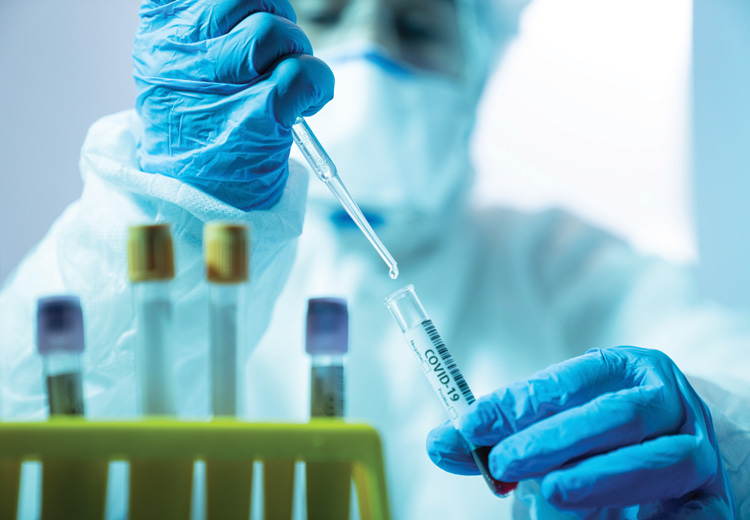Nature’s answer to Covid-19 treatment

Sponsored by

Sponsored by

The antiviral qualities of medicinal plants could combat the coronavirus. Such discoveries prove that the drug discovery process is ripe for transformation
A novel treatment combining silver nanoparticles and theaflavin, a chemical extracted from black tea, could aid treatments of Covid-19, researchers at Alfaisal University have found. Before the pandemic began spreading around the world, researchers at Alfaisal University in Saudi Arabia were already investigating new drugs to treat diseases. “We thought that combining nature and nanotechnology could be a new area to discover affordable and unique treatments for neglected and infectious diseases,” says Dr Hana Abdalla, assistant professor of medical microbiology at the university. “And then Covid-19 happened.”
The team, headed by Dr Abdalla, had been investigating the use of silver nanoparticles and aloe vera, a succulent plant that originates from the Arabian Peninsula. Both the particles and aloe vera have antimicrobial properties and showed promise in the treatment of leishmaniasis, a parasitic disease. Leishmaniasis, classified as a neglected disease and caused by parasites on sandflies, affects more than 1.5 million people annually. However, when Covid-19 struck, Alfaisal’s researchers switched their focus to theaflavin and its antiviral properties. “We went back to nature to work on materials, such as aloe vera and theaflavins, that are cheap and affordable,” she says.
Theaflavins, the molecules responsible for the bright red colour of traditional black tea, display potent virus-fighting properties, which Dr Abdalla and her collaborators think could assist in the fight against Covid-19. “The product we’re developing will inhibit viral replication and will stop the infection from being established,” she says. Slowing the rate at which the novel coronavirus reproduces in a host could help in serious cases of Covid-19 but can also reduce the severity of symptoms for Covid-19 patients who may not experience a life-threatening disease but suffer uncomfortable symptoms nonetheless.
The team – which includes investigators from the university’s departments of pharmacology, molecular virology and nanotechnology, as well as international collaborators – is testing the toxicity of the theaflavin-nanoparticle mixture. This is part of a larger drive by the university and the country, Dr Abdalla says. The microbiology department, alongside Alfaisal University’s College of Medicine, has established partnerships with the Saudi government, the country’s drug regulators and the private sector.
Healthcare is at the heart of Saudi Arabia’s Vision 2030, a national strategy guiding the future of the Gulf country. Vision 2030 positions scientific medical research as an essential aspect of basic healthcare provision. Drug discovery – such as is under way at Alfaisal University – is seen as a way to boost economic development and diversify the country’s economy through the development of a new industry.
Dr Abdalla, who joined Alfaisal University in 2018 after working in Sweden and the US, has also worked on meningitis and tuberculosis treatments. She has brought this experience, and her international networks, to Alfaisal University. “I continue collaborating with my old workplaces – it helps generate new knowledge that could be used for research,” she says.
In collaboration with her Swedish partners, Dr Abdalla and her students are screening medicinal plants for compounds that could be used to treat diseases. So far, they have screened more than 150 compounds to identify those with antimicrobial effects. “We want to screen for hospital- and community-acquired infections. This will make us ready in case of new antibiotic-resistant strains,” she says.
Antimicrobial resistance occurs when bacteria, viruses, fungi and parasites change over time and no longer respond to medicines, making infections harder to treat and increasing the risk of disease spread, severe illness and death. To treat these resistant strains, scientists are looking for new drugs and ways of killing these pathogens. “Antibiotics are becoming increasingly ineffective as drug resistance spreads globally, leading to more difficult-to-treat infections and death,” the World Health Organization says. “New antibacterials are urgently needed.”
Researchers at Alfaisal University are working to respond to that need, but Dr Abdalla hopes their research into theaflavins and silver nanoparticles will help people sooner rather than later. “There are still no clear antiviral drugs for Covid-19,” she says. “We want to join the global scientific community and contribute.”
The standard treatment for Covid-19 remains supportive and, in most cases, revolves around providing sufficient oxygen. “Awake proning”, or turning patients onto their stomachs, has proven successful, but effective targeted therapies are not yet in mainstream use. In the meantime, the potential ability of Sars-CoV-2 to develop the capacity for antibody resistance suggests that eradication of the virus could be tough and that treatment for Covid-19 is needed, and fast.
Once, drug discovery took years, but Dr Abdalla believes the speed with which the global community developed vaccines to neutralise the novel coronavirus is proof that it is possible, with government support, to speed up the drug discovery process. This is why collaboration is so important, she says, noting that the university has agreements in place with pharmaceutical companies, which could accelerate drug discovery. “We work quite closely with the Saudi Center for Disease Prevention and Control, the [local] ministry of health and the Saudi Food and Drug Authority,” she says. “That will collectively have a bigger chance for Alfaisal University to move more quickly in such projects.”
As the Covid-19 pandemic has shown, responsive research saves lives. “We have the resources to test immediately [once we identify compounds that act against these resistant strains],” says Dr Abdalla. “I see this as a promising area.” In the next two months, the team will have completed the toxicity tests on their Covid-19-fighting mixture, with the hope of moving to animal tests soon. “We’re working on it and hopefully this will not just be for Covid-19,” she says. “It will help us prepare for future pandemics and work in eradicating such virus attacks.”
Find out more about the department of microbiology and immunology at Alfaisal University’s College of Medicine.